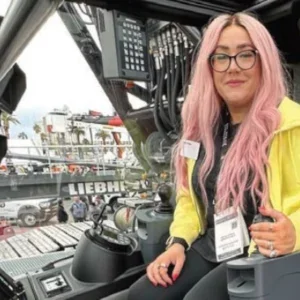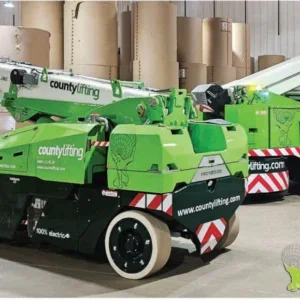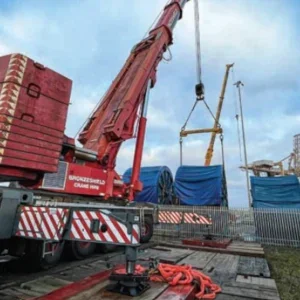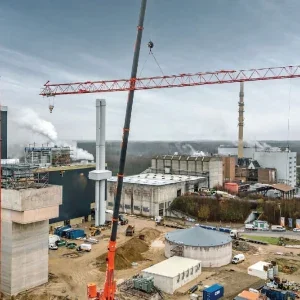MC: We were introduced a year ago by AmQuip’s investment banker, DeutscheBank, who knew Wesley was interested in retiring, and that he did not want a formal auction, but wanted the best owner.
WD: Why did it take so long?
MC: We went through a get-to-know you phase. There were some structural things to consider. Joe started this business with one crane in 1967, and has since built it to 575 cranes 40 years later. Unlike private equity groups who are in on a deadline, do the deal and are out again, we’re not in any rush. Joe had to get comfortable with wanting to leave, the price, the structure, the transition.
FB: This isn’t just an asset company sitting on the sidelines. New equipment is coming in monthly, it’s a moving target when you close.
MC: We had year-end to get through, and had to get an audit done. The other thing was that Joe would be an investor going forward, and he had to consider how much he would reinvest, and what life would be like after: his personal estate planning.
WD: Who are the other investors?
MC: We are linked with several pools of institutional capital that we can draw on depending on the deal, its size and the industry. They include Lehmann Brothers and Joe Wesley, and other limited partners and affiliate investors [who he declined to name].
The executive management team has bought into the transaction, and the company is developing an incentive plan. [Bardonaro confirmed that the new shareholders include himself and Dennis Bates, vice president of the tower crane division, Clark Elliott, vice president of the Midwest region, Bill Pace, vice president of sales, and Michael Good, vice president of operations.]
Our group does only a handful of transactions, but gets very involved. That doesn’t mean taking on a day-to-day role, but it does mean filling gaps in key personnel, providing strategic guidance and advice. We’ll roll up our sleeves and develop parts of the company, operations, technology and finance. We’re developing a strategic plan. This business has been run by a 70-year-old entrepreneur, who is now transitioning out of the business, who does not have the benefits of capital to invest in a broader management team. We plan on improving operations, rebalancing the fleet, investing in a regional fleet. We want to grow the business. We bought it not to run it like Joe did, but to make it bigger, better and to offer a higher level of quality for employees and customers.
WD: Does that include acquisitions?
FB: We have always pursued strategic acquistions where they make sense, and organic growth. We have plans to grow both.
MC: The idea is not to do a Maxim, to buy up as much as we can: anyone can do that. Our acquisitions will be very strategic, in a new geography, or acquiring a broader management team for more resources, or new markets for growth.
FB: Acquisitions would only be with companies whose business philosophy and management philosophy make it possible that we can work together. We’re also looking at this as an opportunity to roll out the older, less utilised machines from the fleet, although we have already spent $150m on the fleet in the last two years.
WD: What financial targets has Bard set for 2007?
MC: We expect the company to maintain its plan, identify value-enhancing opportunities and pursue them. We’d be happy for AmQuip to deliver that plan this year, get settled in, make sure that the structure is bulletproof. We are starting on a 2008 budget soon.
This is an important transaction for us, and we’ll be around as often as needed. We are a 24/7 sounding board, and will take on projects to assist the management team. We have appointed Dennis Fiore at AmQuip as chief financial officer. Other than that, we don’t forsee any management changes.
FB: They are readily available. We are going away from some of the other things that have happened in the industry. Bard’s reason to buy is that they are comfortable with the management team, and they are supporting things that we haven’t had support to do in the past. AmQuip has management run by crane people with a strong financial backing from Bard.
MC: We won’t buy a company where we can’t add value. The value-add here is helping to take AmQuip’s existing infrastructure to the next level.
FB: Bard has the financial power to prepare us for the down cycle. We now see the down cycle as an opportunity to grow more, because of our financial health. We might get some pretty nice acquisitions.
WD: Does that include spreading outside the USA?
MC: Yes. We’re going to take a hard look at Canada, and as we develop our infrastructure to accommodate growth, we will look beyond North America at some point.
FB: Bard operates some European businesses, whose expertise might be interesting for us at some stage.
Frank Bardonaro, president of AmQuip Frank Bardonaro, president of AmQuip Michael Carrazza, managing director of Bard Capital Michael Carrazza, managing director of Bard Capital






